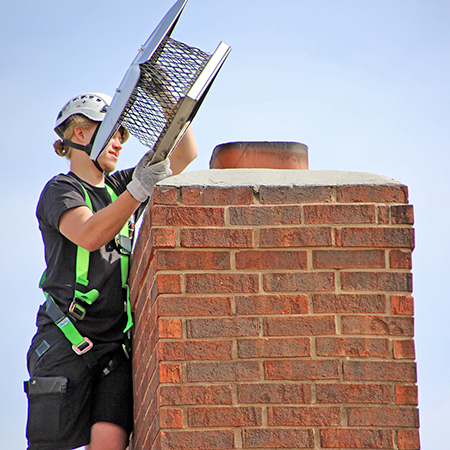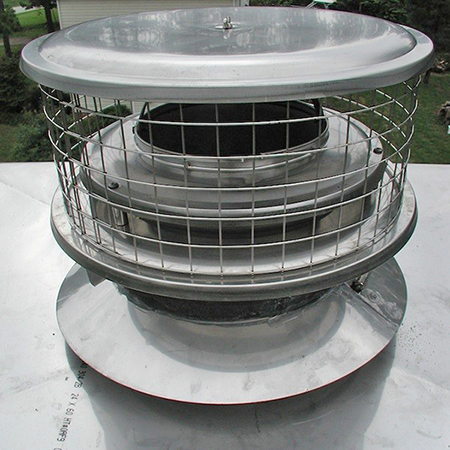 The chimney cap is one of the most vital parts of a chimney. Its primary purpose is to protect the masonry chimney crown & open flue. There are two kinds of chimney caps. Many fireplaces, especially in older homes, have an open style chimney cap that was made from leftover cement and mortar from the original chimney construction. It is sloped to help push water and snow away from the chimney, but the flue is still exposed. The other kind of cap contains a metal mesh screen that covers the flue opening. It has an added advantage of helping to prevent animals, pests, and debris from obstructing the flue while still allowing smoke and fumes to vent. Regardless of the type of chimney cap you have, it will eventually need replacement.
The chimney cap is one of the most vital parts of a chimney. Its primary purpose is to protect the masonry chimney crown & open flue. There are two kinds of chimney caps. Many fireplaces, especially in older homes, have an open style chimney cap that was made from leftover cement and mortar from the original chimney construction. It is sloped to help push water and snow away from the chimney, but the flue is still exposed. The other kind of cap contains a metal mesh screen that covers the flue opening. It has an added advantage of helping to prevent animals, pests, and debris from obstructing the flue while still allowing smoke and fumes to vent. Regardless of the type of chimney cap you have, it will eventually need replacement.
Water and debris in the firebox
Water is the mortal enemy of the chimney. It can soften the masonry leading to extensive damage and repairs. And if water and debris are getting into your fireplace, then smoke and fumes may also be invading your living space. When this occurs, the chimney cap should be inspected and replaced if damaged. Otherwise, you will need a more thorough inspection to determine the source of the water intrusion.
Your cap blew off
Although the chimney cap is tightly secured to the chimney crown, its continued exposure to strong winds and heavy rain could cause it to loosen or blow off the chimney. Also, your chimney cap may not have been installed correctly in the first place. The wrong size cap or incorrect installation can also cause it to separate from the chimney. When you look up at the roof and notice the chimney cap is missing, it is time for an immediate replacement.
Excessive presence of rust
 You should also replace the chimney cap when it begins to rust or corrode. The continuous exposure to moisture, creosote, and other contaminants can result in rust or corrosion and weaken its effectiveness. When the chimney cap is heavily rusted, it can easily rip apart. Even small animals looking for shelter can force their way through the weakened mesh and obstruct the flue.
You should also replace the chimney cap when it begins to rust or corrode. The continuous exposure to moisture, creosote, and other contaminants can result in rust or corrosion and weaken its effectiveness. When the chimney cap is heavily rusted, it can easily rip apart. Even small animals looking for shelter can force their way through the weakened mesh and obstruct the flue.
Your experiencing downdrafts
On windy days, a sudden gust of wind can force air straight down the stack. It can also be very messy when soot, creosote, and ash are blown into your living space. A damaged or missing chimney cap is usually the culprit. Replacing the chimney cap will minimize downdrafts.
A structurally sound and well-installed chimney cap is vital to preventing water intrusion and flue obstructions. It will also protect the chimney crown and minimize chimney repairs. If it’s been more than a year since your last chimney inspection, give us a call to schedule a visit. We will inspect the chimney cap and recommend replacement, if necessary. In most cases, we can install your new chimney cap during the same visit.



